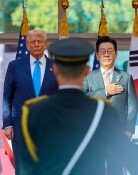Pressure is an efficient means for negotiation with N. Korea
Pressure is an efficient means for negotiation with N. Korea
Posted April. 02, 2018 07:45,
Updated April. 02, 2018 07:46
South Korea and the United States kicked off Sunday their annual joint military drill known as “Foal Eagle,” which had been delayed due to February’s Winter Olympics in the South. It includes a series of field training exercises involving American and South Korean troops and weapons, and will be held for a month, about half the time it usually lasts. South Korean military authorities have said that though the drill will be defense-oriented and low-key compared to previous years, there would be no change in the intensity of the exercise.
Also on Friday (local time), the United Nations Security Council (UNSC) added 27 ships, 21 companies and a businessman to its blacklist for helping North Korea evade sanctions and smuggle oil and coal into the country. The additional set of sanctions is particularly noteworthy as it came at the request of the United States and was also approved by China, permanent member of the UNSC, despite the first-ever meeting between Chinese President Xi Jinping and North Korean leader Kim Jong Un. Many had voiced concern that China, following the talk with North Korea, would not back the new package of sanctions at the UNSC.
It seems that Kim Jong Un has been making greater reconciliatory moves in an effort to lift economic sanctions. Kim reportedly even mentioned the country’s willingness to participate in the 2020 Summer Games in Tokyo and the 2022 Winter Games in Beijing during a meeting with International Olympic Committee President Thomas Bach on Tuesday. For sure, North Korea seems to be mounting its charm offensive ahead of the scheduled inter-Korean summit on April 27 and next month’s North Korea-U.S. talk. What drove the North to change its attitude is the persistent implementation of sanctions and pressure. If there’s any lesson learned from the past 25 years of negotiation with Pyongyang, it would be the fact that we cannot lead the dialogue without pressure.







